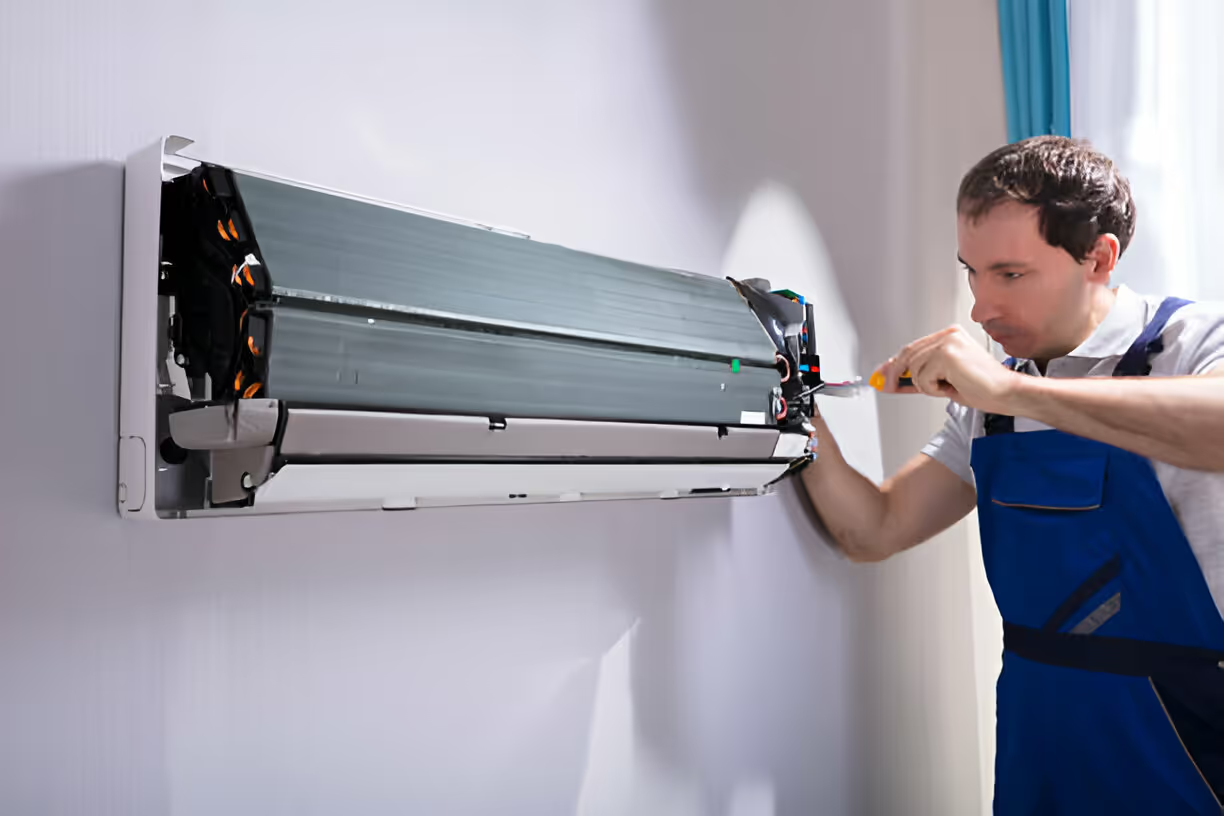Mini-Split Maintenance in Auburndale, FL


Why routine mini-split maintenance matters in Auburndale, FL
Auburndale’s climate places extra stress on HVAC equipment. High humidity encourages coil and drain line buildup and microbial growth. Extended cooling seasons mean compressors and fans run more hours than in temperate regions. Heavy pollen and yard debris collect on outdoor units during spring and summer, and storm-related debris and flooding risk can affect outdoor condensers. That combination makes regular maintenance not optional if you want predictable performance and lower operating costs.
Common mini-split maintenance issues in Auburndale
- Clogged filter and indoor coil buildup: Reduced airflow, lower capacity, higher energy use, and ice on the evaporator coil.
- Blocked or slow condensate drain lines: Water overflow, indoor humidity problems, and potential mold growth.
- Outdoor unit debris and corrosion: Leaves, grass, and pollen reduce heat transfer; corrosion speeds component wear.
- Refrigerant leaks or improper charge: Low cooling capacity and compressor strain leading to premature failure.
- Electrical wear and loose connections: Failed capacitors, relays, or wiring that cause intermittent operation or safety issues.
- Control and sensor issues: Inaccurate temperature sensing or communication faults between indoor and outdoor units.
- Storm-related damage: Bent fins, loose mounts, or water intrusion after heavy rain or storm surge events.
What a seasonal mini-split tune-up includes
A standard seasonal tune-up addresses airflow, heat transfer, refrigerant performance, electrical safety, and drainage. Typical tasks performed by a trained technician:
System performance check and operational test
- Run cooling and heating cycles to verify startup, runtime, and cycling behavior.
- Measure supply and return temperature differentials to confirm capacity.
Filter inspection and cleaning/replacement
- Clean washable filters or advise replacement frequency.
- Recommend higher-efficiency filters for allergy concerns or heavy pollen seasons.
Indoor evaporator coil cleaning
- Remove surface grime and microbial buildup to restore airflow and heat exchange.
Outdoor condenser coil cleaning
- Clear debris, wash coils, and straighten fin damage to improve efficiency.
Condensate drain line clearing and trap inspection
- Flush lines, remove blockages, and verify proper drainage to prevent water damage and mold.
Refrigerant level check and leak inspection
- Verify proper refrigerant charge; inspect for signs of leakage and abnormal pressure readings.
Electrical inspection
- Tighten electrical connections, test capacitors, contactors, fuses, and circuit protection for wear.
Blower motor and fan inspection
- Lubricate bearings if applicable, inspect belts and fan blades, and verify motor amperage draw against specifications.
Control and thermostat checks
- Verify remote control or wall controller communication and sensor calibration.
System safety checks
- Confirm proper safety interlocks, float switches, and any manufacturer-specified protections.
Diagnostic and testing details
Technicians use a combination of visual inspection, measured readings, and manufacturer specs. Expect measurements such as:
- Temperature split across the evaporator to assess cooling performance.
- Suction and discharge pressures to evaluate refrigerant performance.
- Motor current draw to detect failing motors or overloaded circuits.
- These diagnostics indicate whether simple cleaning and adjustments are sufficient or if repairs (refrigerant repair, part replacement) are needed to prevent failure.
Recommended service frequency for Auburndale homes
- Basic upkeep: Inspect filters monthly; clean or replace as needed during high pollen or heavy use periods.
- Professional tune-ups: At least once per year for lightly used systems; for Auburndale’s climate, a biannual schedule (spring and fall) is recommended to prepare for peak cooling and to inspect pre-winter operation.
- High-use or sensitive environments: Homes with allergy sufferers, home offices, or continuous cooling needs should consider quarterly professional inspections.
Benefits of regular mini-split maintenance
- Improved energy efficiency: Clean coils and correct refrigerant charge reduce runtime and electricity costs.
- Fewer unexpected breakdowns: Early detection of failing components prevents mid-summer failures when demand is highest.
- Longer equipment life: Routine care reduces stress on compressors, fans, and controls, extending the system’s useful life.
- Better indoor air quality: Clean filters and coils lower dust, pollen, and microbial contaminants circulating indoors.
- Consistent comfort: Proper airflow and charge keep temperature and humidity control steady, important during Auburndale’s humid summers.
- Warranty compliance: Many manufacturers require regular maintenance to keep warranty coverage intact.
What to expect from mini-split maintenance agreements in Auburndale
Maintenance agreements are structured to remove guesswork and prioritize your system during peak seasons. Typical features include:
- Scheduled tune-ups: Two or more annual visits timed for pre-summer and pre-winter checks.
- Filter program: Scheduled filter replacement or cleaning reminders based on model and household needs.
- Priority service: Faster response times during high-demand periods to reduce downtime.
- Discounted diagnostic or repair labor: Reduced rates on parts and labor for agreement members.
- Seasonal preparedness: Storm-season inspections and guidance on securing outdoor units before severe weather.
- Maintenance records: Documentation of performed services and findings to protect warranties and track system health.
Final considerations
For homeowners in Auburndale, FL, a proactive mini-split maintenance program addresses the unique challenges of hot, humid weather and seasonal pollen. Regular tune-ups, filter care, drain clearing, refrigerant checks, and electrical inspections deliver measurable benefits: lower utility bills, fewer emergency repairs, and more reliable, comfortable indoor environments. Maintenance agreements provide predictability and priority during peak demand periods and after storms, making them a sensible option for preserving equipment performance and value.
Service Areas


